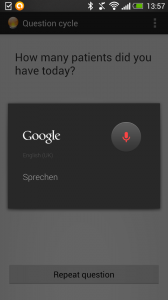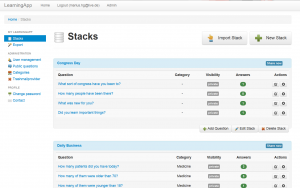REFLECT: Community-Driven Scaffolding for Voice-enabled Reflection on the Go
Together with my colleagues, Christine Kunzmann, Andreas P. Schmidt, Graham Attwell1, Elizabeth Chan2, Marius Heinemann-Grüder, Jenny Hughes, Wenlin Lan2, Andreas Vratny and Andreas Heberle, we have produced a short paper for the forthcoming ARTEL workshop on Awareness and Reflection in Technology-Enhanced Learning at the ECTEL conference.
The paper explains the thinking behind the Reflect App which we hope to launch as a Beta next week.
Abstract
REFLECT is a mobile app that promotes a regular reflective routine. It is voice-based so that it can be used, e.g., while driving a car or in similar situations. The reflection session is scaffolded through decks of questions that can be configured by the other and shared with others, who in turn can reuse the questions.
Introduction
Reflective learning is seen as one of the key activity for workplace learning that is most neglected because of time pressure in everyday business. This particularly ap- plies to General Practitioners (GPs) who are on a tight schedule between slots for consultation and home visits. From the need to make learning activities traceable for re-certification, there is, however, an interest from doctors to reflect on learning experiences and to follow-up on learning opportunities arising from everyday practice. Key approach is to create reflection opportunities by utilizing time slots like when driving in the car from/to a home visit, o r commuting.
r commuting.
Concept
The key idea behind REFLECT is that reflection support is based on voice interactions, which allows for hands-free operation. Users can record their reflection sessions, and the system transcribes it and sends it to them via e-mail for further processing, e.g., for including in a personal note-taking or task management tool, or a personal portfolio for future reference.
But reflection also needs scaffolding, particularly if it is supposed to take place embedded into working processes like in between home visits. This is achieved through recording the reflection session in the form of a structured interview along a deck of questions. The app reads the question (via text-to- speech) and then records the user’s responses. Via special voice commands (e.g., “next question”), the user can skip questions.
Useful questions for reflection cannot be pre- defined by the app designer, as they are situation- dependent (reflecting on the day/last patient, reflection on a longer period of time, reflecting after a training session) and there is no general knowledge about (i) which situations are relevant, and (ii) which questions are useful for which type of user. Therefore the app is complemented by a web-based interface that allows for choosing decks of questions that have been shared by others, for rating their usefulness, and – as soon as the learning becomes more confident and experienced in reflective practice to define own new questions and to share them with others.
This results in a lightweight and community-driven approach to scaffolding reflection, which also provides the opportunity for maturing the collective knowledge how to best structure such reflection sessions.
System
The system consists of an app to be installed on a smartphone or tablet (the current version requires Android 4.1 or higher – other systems are planned),  and a web-based backend. The app allows for choosing a deck of questions, reads the questions to the user and transcribes the responses of the user and reacts voice commands. Towards that end, the Google Text-to-Speech and Speech-to-Text APIs are used. While this voice recognition does not deliver 100% accuracy, first tests have shown that under realistic conditions (e.g., in a car) the system produces a sufficient of quality of the resulting transcript to be useful for the user.
and a web-based backend. The app allows for choosing a deck of questions, reads the questions to the user and transcribes the responses of the user and reacts voice commands. Towards that end, the Google Text-to-Speech and Speech-to-Text APIs are used. While this voice recognition does not deliver 100% accuracy, first tests have shown that under realistic conditions (e.g., in a car) the system produces a sufficient of quality of the resulting transcript to be useful for the user.
The backend is based on PHP, and users the Bootstrap framework. It gives the user the possibility to configure decks of questions, share them with others, use shared questions from others and rate them.
The app will be available from the Google Play Store and from the Pontydysgu website.
Outlook
As part of the Learning Layers project, this app is planned to be evaluated with a larger number of users as part of General Practitioners’ everyday work practice. Further- more, it is planned to complement the Android app with an iOS solution to cover the different types of smartphones used by the target group.
Acknowledgements. This work is supported by the European Commission under the FP7 project LAYERS (no. 318209), http://www.learning-layers.eu.
